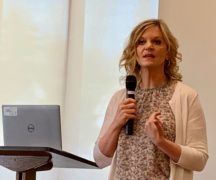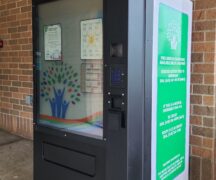By JULIE CARLE
BG Independent News
The Wood County Alcohol, Drug Addiction and Mental Health Services Board has taken the initial steps to place a renewal levy on the ballot in November.
Last month, the board passed a resolution to start the process to request that a 1.6 mill renewal levy be placed on the general election ballot. The issue, if approved, would be for 10 years and generate approximately $4.2 million per year for alcohol, drug addiction and mental health services in the county.
The 1.6 mill levy was passed in 2014 and is scheduled to end this year.
“The renewal levy is for the same amount of money we received in the last levy. Clearly a renewal is the safest way to go,” Board Chair Frank McLaughlin said. He praised the staff for their work at identifying and accessing grants and various state and federal funding sources to complement the levy funds.
“Not only is it the safest, but it is politically correct,” said Judy Ennis, board vice chair.
“And it is adequate to meet our needs,” added Julie Launstein, director of finance.
Earlier this month Board staff met with the Wood County Board of Elections and the Wood County Commissioners, formally requesting a resolution to be on the ballot in November.
Agencies begin System of Care allocation requests
The board has started the allocation process where county service providers provide updates about services and plans for the next fiscal year.
Dr. Bill Ivoska shared an abbreviated version of the 2024 Youth Survey that is funded by WCADAMHS and implemented through the Wood County Educational Service Center (WCESC).
Based on the youth survey results, Ivoska said efforts for the coming year should “work the middle. We can’t protect kids from everything, but we can work on their skills of how they handle what happens to them.”
“Prevention works,” said Kyle Clark, WCESC director of prevention education.
According to Angela Patchen, WCESC prevention education program manager, with the support of the county board, the agency has been providing evidence-based, evidence-informed programs that reach youth in different ways to address substance abuse, suicide, violence, sexual abuse, dating violence, alternative and one-on-one education in the schools and sponsored programs for 20 years.
They work with approximately 18,000 students in nine school districts and the Penta County Career Center.
For the next fiscal year, the center is requesting an additional $194,000 for salary and benefits for a coordinator to supervise the diversion program and act as a community liaison, kinship support group leader and oversee the credit recovery program. The funds would also support two staff to help with diversion screening and some kinship support, mileage and supplies.
Harbor Health CEO Dustin Watkins said the agency serves more than 27,000 people each year through mental health and substance use disorder treatment. They also offer a vocational program for their clients and provide Employee Assistance Programs to employees of many area businesses and organizations. They have 24 locations and 550 employees, including over 300 clinical professionals.
”There’s a broad scope of experience that we leverage in meeting the needs of the people we serve,” Watkins said.
Among the Harbor services that the WCADAMHS Board supports are the Housing Assistance Program and a position to work with clients in the three Bowling Green apartment complexes run by Harbor.
The Housing Assistance Program provides funds to individuals who need short-term rent assistance to live close to family members rather than in Harbor housing or who need to buy furniture or pay a deposit for utilities, said Chief Housing Officer John Fortner.
“We provide support and interactions with individuals” to make sure they are handling the day-to-day necessities, he said.
They also do forensic monitoring for people who have been found not guilty by reason of insanity, transition to independence programs for young adults 18 to 24 years old, group homes “for individuals with more profound difficulties,” semi-independent housing, Individual Placement and Support, “an evidence- based model to provide employment services to the people we serve,” and substance use disorders for women at Devlac hall, Fortner said.
Jessica Hartman, executive director for the National Alliance on Mental Illness (NAMI) Wood County, outlined the multitude of programs offered from support groups to community education and engagement.
NAMI Wood County is part of the national organization that works tirelessly on education and awareness, as well as support for individuals living with mental illness and their family members, caregivers, and professionals.
“With 80% of caregiving being provided by family members, NAMI can help support, educate and support them, and help them navigate the mental health system,” Hartman said.
The recent Wood County Health Department Health Assessment identified that mental health needs in the county are increasing. “We can help provide education to alleviate the stigma that is addressed in some of these reports,” she added.
Mental health awareness events in Wood County are made possible by the WCADAMHS support, Hartman said. However, NAMI has not received increased funding in several years, despite increased costs due to inflation.
With the increased insurance costs, workman’s compensation and utilities, it is difficult to budget for raises, she said. The staff of five are all educated and have lived experiences.
“If I’m not able to give raises, which I haven’t for a few years, I’m going to lose my talented and dedicated staff. If one person leaves, that’s 20%. We are an organization that is continuing to meet outcomes for this board,” Hartman said.
CHESS Health phone app behind schedule
There has been little to no progress by CHESS Health to implement a smartphone app that supports individuals during and after treatment for substance use disorders. The county board is unhappy that they have seen no results since the contract was approved last year with a July 1, 2023, start date.
They discussed terminating the contract and have been in contact with an attorney regarding options for getting out of the contract and recouping at least a portion of the more than $80,000 they paid for the first year implementation.
WCADAMHS Executive Director Amanda Kern met with the CHESS Health CEO, who offered a six-month extension at no cost.
“We are comfortable giving them the opportunity to fix this because of how well-received they have been within the state,” Kern reported.
Aimee Coe, director of community programs, reported that she continues to work to implement the e-prevention on the WCADAMHS website and social media. “There are several pieces to have everything implemented; they are stepping up to the plate and performing as I would have expected them to at the beginning.”
Board member Matt Battiato said, “It’s been nine months, and they are offering six months? I don’t have a lot of faith in this company. Nine months in and they haven’t produced.”
In other business, the board approved the Fiscal Year 2025 Administrative Budget totaling $1,013,417.





